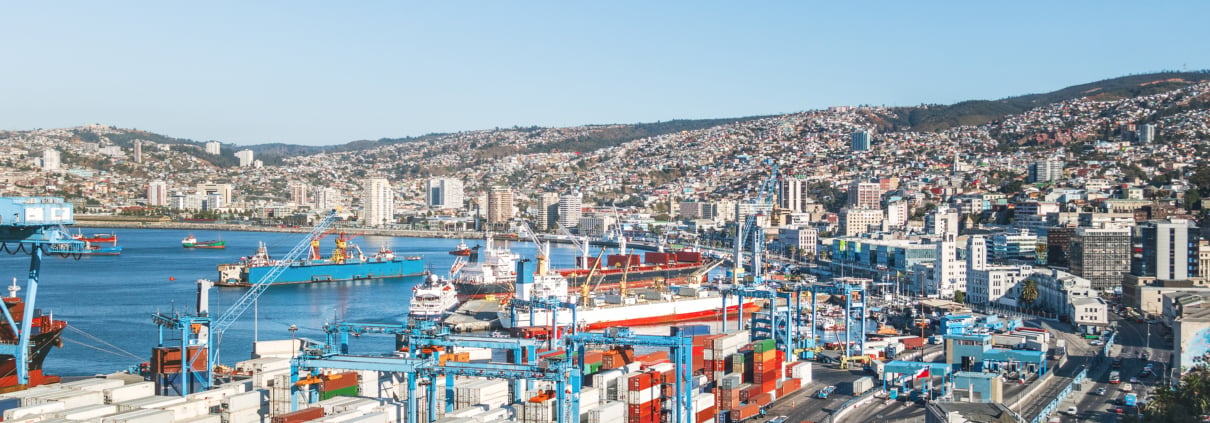Export successfully: Import regulations for Chile
- Almost all customs duties on EU goods will be eliminated by the new trade agreement
- Only registered companies based in Chile are authorised to import
- Registration in the REX system is required for goods over 6,000 euros
- Food, pharmaceuticals and agricultural products require additional evidence
- Co-operation with experienced customs brokers is mandatory for many product groups
- Dörrenhaus offers comprehensive support for imports to Chile
Chile is a strategic trading partner for many companies. The import regulations for the South American country are very specific. Knowing them is essential for smooth customs clearance and compliance with legal requirements.
Anyone wishing to export or import goods to Chile must familiarise themselves with customs regulations, documentation requirements and product rules. This article provides a systematic overview of all aspects of Chilean import regulations.
Chile in international trade
Chile is actively involved in international trade. The country is a member of the World Trade Organisation and part of important trade alliances such as CPTPP, APEC, Pacific Alliance and ALADI.
The Chilean economy is open to imports and exports, and European companies can take advantage of several free trade agreements. Chile offers an attractive environment for SMEs thanks to its reliability, planning security and stable framework conditions.
- Chile is part of numerous international trade agreements
- European companies benefit from duty-free or reduced-duty imports
- Medium-sized companies find stable investment conditions
Free trade agreements and international framework conditions
Trade between the European Union and Chile is based on the Interim Trade Agreement, which has been in force since 2025. This agreement has enabled the elimination of almost all customs duties and modernised the rules of origin. In addition to the ITA, there are numerous other free trade agreements, for example with the USA, China, Mercosur countries and the Pacific Alliance. Companies benefit from customs advantages if they fulfil the requirements of the respective agreements.
Rules of origin and proof of preference
The import regulations for Chile require clear proof of the origin of the goods. New rules of origin have applied since the ITA came into force. A declaration of origin is sufficient for goods up to 6,000 euros. For higher values, registration in the REX system is required. The REX number serves as identification for exporters who are authorised to submit declarations of origin independently. Compliance with the rules of origin reduces costs and facilitates access to the Chilean market.
Note: Only correctly proven origin secures customs benefits and avoids subsequent additional payments.
Requirements for importers
Only companies based in Chile with a valid tax identification number are authorised to import. Registration in the tax portal and registration of the business activity are required.
The use of an authorised customs agent is mandatory for commercial shipments with higher goods values. Importers must also organise the processing of foreign currency procurement with their bank in order to carry out payment transactions in accordance with the legal requirements.
Customs procedure and process
Imports to Chile follow a set process. Goods are first stored in official warehouses before they are released for free circulation or undergo another customs procedure. The most important procedures include release for free circulation, customs warehousing, temporary admission, processing and transit. The deadlines and processes are precisely defined. Companies with OEA status can benefit from accelerated processes.
Overview of the most important customs procedures:
- Clearance for free circulation allows the goods to be used on the Chilean market.
- The customs warehousing procedure is suitable for temporary storage under customs supervision.
- Temporary use allows temporary imports with reduced duties.
- Processing relates to goods that are imported for further processing.
- The transit procedure regulates the transport under customs supervision to another destination.
Import regulations for Chile: Documents and accompanying papers
Certain documents must be submitted for each consignment of goods. These include freight documents, commercial invoices, proof of origin, packing lists and, if applicable, insurance certificates. Further evidence may be required for special products or processes. Digital processing is becoming increasingly important thanks to systems such as ClaveÚnica, which is used for numerous administrative procedures.
Note: The complete and correct preparation of all documents prevents delays in the customs process.
Customs duties, taxes and levies
The Chilean customs tariff is based on the international HS system and is supplemented by special national features. A general ad valorem duty of six per cent on the CIF value applies to goods from countries without a free trade agreement.
VAT is 19 per cent and is levied on the value of the goods including customs duty. Special product groups such as luxury goods, alcoholic beverages, tobacco and petroleum products are subject to additional taxes. There are concessions for capital goods, certain countries and in free zones.
Import bans and restrictions
Not all goods may be imported into Chile. Products prohibited by law include used vehicles, asbestos, certain industrial waste and special cultural goods. Other goods are subject to import restrictions and require authorisations, registrations or certifications. The responsible control authorities are defined in each case, such as SEREMI for foodstuffs, SAG for agricultural products and ISP for pharmaceuticals.
Product-specific regulations
Foodstuffs are subject to extensive controls and often have to present health certificates and special certificates. Pharmaceuticals, medical products and cosmetics must be registered with the Ministry of Health. Agricultural products must fulfil phytosanitary requirements. Wooden packaging must comply with ISPM 15 and be correctly labelled. There are also specific reporting and labelling requirements for chemicals and hazardous substances.
Import regulations for Chile: packaging and labelling
The packaging must ensure the integrity of the products during transport and storage. Labelling is mandatory for many product groups. Foodstuffs, for example, require information on ingredients, origin, producer, shelf life and nutritional value. Industry-specific labelling decrees apply to textiles, chemical products and pharmaceuticals. Violations of these rules lead to delays or penalties on import.
Technical norms and standards
The National Standardisation Institute INN implements technical standards in Chile. Binding standards must be complied with for some products, particularly in construction, industry and packaging. Compliance with international and national standards is relevant in terms of market access and safety. Importers should inform themselves about the specifications applicable to their product.
Note: Compliance with the applicable standards is mandatory for market access and product approval.
Import regulations for Chile: practical tips for importers
Successful imports to Chile require cooperation with experienced customs brokers and service providers. Errors in documentation or in selecting the right customs procedures can lead to delays. Careful preparation of all documents and early clarification of product-specific requirements are essential for speedy customs clearance.
Dörrenhaus - Your specialist for safe imports to Chile

Would you like to import goods to Chile and reliably fulfil all import regulations? As an experienced partner, Dörrenhaus will guide you through all the challenges of the Chilean customs and import process. We have first-hand knowledge of the current regulations, rules of origin and documentation requirements and offer you customised solutions that are precisely tailored to your requirements.With our international network, our own specialists and modern IT systems, we ensure that your consignments arrive efficiently, legally compliant and on time.
Our experts handle all communication with the authorities, take care of the complete documentation and are available to you as a personal contact at all times. In this way, you avoid unnecessary delays and create security for your company. Take advantage of our many years of experience and gain a decisive advantage in the Chilean market.
FAQ
What import regulations for Chile apply to European companies?
European companies usually benefit from duty-free or reduced-duty imports to Chile thanks to current trade agreements. The prerequisite is compliance with the rules of origin and the correct documentation of all necessary evidence.
Does an ad valorem duty apply to all products?
A general ad valorem duty of six per cent applies to goods from countries without a free trade agreement. Products from countries with agreements, such as the EU, are subject to separate or reduced customs duties.
Which product groups are subject to special restrictions?
Special restrictions apply to foodstuffs, pharmaceuticals, chemicals, agricultural products and certain technical goods. Additional authorisations or certificates are required for their import.
Who can import goods into Chile?
Only companies based in Chile with a valid tax identification number are authorised to import goods. Registration with the Chilean tax portal is also necessary.
How does Dörrenhaus help with imports?
Dörrenhaus takes care of the entire import process, from documentation to communication with the authorities. You receive personalised advice and a dedicated contact person for all process steps.



